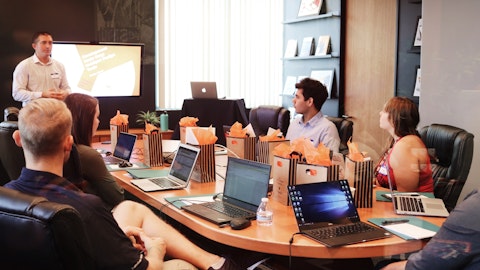Resources Connection, Inc. (NASDAQ:RGP) Q3 2024 Earnings Call Transcript April 3, 2024
Resources Connection, Inc. isn’t one of the 30 most popular stocks among hedge funds at the end of the third quarter (see the details here).
Operator: Good afternoon, ladies and gentlemen, and welcome to Resources Connections, Inc. Conference Call. Currently, all participants are in a listen-only mode. Later, we will conduct a question-and-answer session and instructions will follow at that time. As a reminder, this conference call is being recorded. At this time, I would like to remind everyone that management will be commenting on results for the third quarter ended February 24, 2024. They will also refer to certain non-GAAP financial measures. An explanation and reconciliation of these measures to the most comparable GAAP financial measures are included in the press release issued today. Today’s press release can be reviewed in the Investor Relations sections of RGP’s website and filed today with the SEC.
Also during this call, management may make forward-looking statements regarding plans, initiatives and strategies and the anticipated financial performance of the company. Such statements are predictions and actual events or results may differ materially. Please see the Risk Factors sections in RGP’s report on Form 10-K for the year ended May 27, 2023 for a discussion of risks, uncertainties and other factors that may cause the company’s business results of operations and financial condition to differ materially from what is expressed or implied by forward-looking statements made during this call. I will now turn the call over to RGP’s CEO, Kate Duchene.

Kate Duchene : Thank you, operator. Good afternoon, everyone, and thank you for joining us today. In Q3, we delivered solid performance across the enterprise despite a macro environment that continues to be sluggish and uncertain. In the quarter, client engagement extensions and client retention have been robust, with new project starts still taking longer to convert than previous cycles. On revenue, we performed consistent with expectations, while also continuing to deliver strong cash flow conversion this fiscal year. On SG&A and therefore, adjusted EBITDA, we well exceeded our expectations, remaining disciplined on cost in this environment and driving efficiencies in headcount. Our balance sheet remains pristine. During Q3, we saw a positive momentum in certain regions.
Asia Pacific returned to growth from earlier quarters in the fiscal year. Our Mexico, India and Switzerland practices all grew year-over-year as we delivered long-term projects for large strategic clients. North America reflected the overall choppy operating environment as clients want more confidence in lower interest rates and improving economic indicators before moving ahead with many major initiatives. Countsy, which is our business unit delivering outsourced finance and accounting and HR services for startups, scale-ups and spinouts also grew in the quarter. In fact, Countsy is seeing the strongest demand for services since the pandemic. Our pricing initiative in the U.S. has progressed with a 1% increase in bill rate year-over-year. Overall, this quarter reflects success with what we can control, including superb customer service and client retention, improving operating efficiencies and maintaining a very strong balance sheet.
This success will allow us to be fast and ready as soon as the broader buying environment improves. Turning to our operational metrics. We’re pleased with that our pipeline remained resilient and steady through the quarter. The pipe is not created equal as we see growth in both health care and financial services opportunities, while other sectors are still cautious. Veracity, our full-service digital transformation business, added almost 100 new opportunities in its pipeline during Q3. We are laser-focused on all the opportunities involving technology, digital and portfolio change. Such deals are non-discretionary, longer term and require larger teams. For example, ERP cloud migration opportunities are on the rise, and we’ve built consulting, delivery and a talent pipeline ready to respond.
See also 40 Best Fashion Schools in the World for 2024 and 11 Best EV Stocks To Buy For The Long Term.
Q&A Session
Follow Resources Connection Inc. (NASDAQ:RGP)
Follow Resources Connection Inc. (NASDAQ:RGP)
Receive real-time insider trading and news alerts
We’re also building thought leadership around SAP S/4HANA migration, including hosting events like the webinar held last week, which drew over 600 registered attendees. Of the largest closed deal won this quarter, the majority involved SAP and Oracle Cloud migration services, digital and finance transformation. During the quarter, we also continued to focus on enhancing our consulting capabilities, which we first outlined strategically during our last Investor Day. Last week, we entered into a definitive agreement to acquire management consulting firm Reference Point. This accretive acquisition is expected to close by early summer, subject to customary closing conditions. Reference Point is an advisory firm serving the financial services sector across 4 areas of focus.
Strategy and management, risk and regulatory compliance, digital and technology and data and analytics. Under the leadership of its managing partner Scott Goeden, Reference Point employs a differentiated consulting delivery model where engagements are led by former industry executives with exceptional backgrounds in technology, digital and data and risk management. Like RGP, the company builds delivery teams using a combination of experienced bench and on-demand talent. We believe this acquisition offers clear benefits to both organizations, allowing us to provide an integrated value proposition to accelerate the growth of our financial services business. With the largest consulting services spend, the financial services industry was one of the first sectors we invested in and has been a top 3 industry vertical for RGP since inception.
This highly strategic acquisition will expand our portfolio of high-value advisory services, particularly in the technology, data and risk management arena. We offer reference point instant access to RGP’s expansive financial services client base and an expert sales team that knows how to effectively sell into this space. RGP’s robust talent engine will help scale its delivery teams with expert on-demand talent. We very much look forward to welcoming the Reference Point team into the RGP family. We feel fortunate to have once again found a business whose culture is well aligned with RGP’s values and our focus on client centricity and client relationships and which expands our growth prospects moving forward. Next, I’m delighted to announce that Bhadresh Patel will serve as our new Chief Operating Officer.
Bhadresh joined RGP in 2019 as the CEO of Veracity. He is an engineer by background and started his professional career at Anderson. He has more than 25 years of experience spanning top-tier consulting firms and boutique specialized consulting firms. A successful entrepreneur, Bhadresh has helped build 2 high-growth digital transformation businesses over the last 10 years. In joining RGP, he has proven to be a critical member of our executive leadership team serving as our Chief Digital Officer and leading Project Phoenix, which, as you know, is RGP’s technology transformation initiative. He is perfectly positioned for this role as we continue to evolve our business to lead with strategic advice and follow with seasoned consultants who execute with excellence.
He knows our enterprise well while also bringing innovative ideas to improve execution to drive sustainable growth. This evolution requires effective coordination across people, process and technology, domains that Bhadresh understands well. As we bring our core consulting capabilities together under a single umbrella, experience delivering with a bench plus on-demand model is critical. In addition, in today’s world where every client problem has an element of digital, automation, use of AI and/or UX, Bhadresh’s background and experience will be invaluable for the future of the firm. Bhadresh will assume his position later this month. In his new role as COO, Bhadresh will continue to lead Project Phoenix. We completed Wave 1 of the project in February with the implementation of our new talent acquisition software, our contract management software and the optimization of sales force for the go-to-market team.
Our project team comprised of internal employees and our own expert consultants did a fantastic job in delivering Wave 1. From my vantage point, on the steering committee for Project Phoenix, I’ve seen our on-demand talent model work brilliantly. Our consultants have taken lead roles in program management, change management, data migration, testing, cutover and functional expertise. For any company undergoing system transformation, having the right combination of insiders and on-demand experts is critical. Most companies do not have the muscle they need solely in-house. We offer clients on-demand experts who deliver with excellent speed and efficiency. It is also a very differentiated client outcome when the on-demand talent is experienced, has judgment and has been to the rodeo many times before.
Finally, I’m pleased to share the results of a recent survey we commissioned with YouGov to discover what priorities financial decision-makers are ready to fund when interest rates start to decline. We learned that more than 80% of the 200 financial decision-makers who participated in the survey plan to increase investment in workforce development. Specifically, most are prioritizing reskilling, upskilling current employees and utilizing new engagement strategies to blend full-time employees with external, on-demand resources. They desire knowledge transfer, independent perspective and financial flexibility. Also, more than half said they would invest new capital in digital transformation and AI. In discussions last week with the global pharmaceutical and medical device clients, I learned they are following this pattern exactly.
They’re funding a total talent initiative to inventory incumbent employee skill sets and development desires and capturing this data with new digital tools. They are also building execution teams related to strategic initiatives with a blend of internal employees and on-demand experts to target exactly the skill sets needed for specific projects for specific periods of time. They are adamant about not carrying full-time employees for skill sets needed only on a fractional basis. In sum, we’re working hard to close every business opportunity with creativity and grit. We are improving our operating model to align our consulting capabilities with more focus and under one leadership structure to also deliver scale with the on-demand talent platform.
We’re improving brand positioning and training for all account development teams to enable more cross-sell to drive growth. Far from standing still, we are aggressively optimizing our business to quickly capitalize on improving conditions to deliver long-term shareholder value. I’ll now turn the call over to Jenn.
Jenn Ryu: Thank you, Kate, and good afternoon, everyone. This quarter, we achieved $151.3 million of revenue, which was consistent with our outlook range provided in January. Both our gross margin of 37% and our run rate SG&A of $45.2 million were significantly better than the favorable end of the outlook ranges provided. We produced solid adjusted EBITDA of $10.8 million or a 7.1% adjusted EBITDA margin and have delivered $34.9 million of free cash flow in the last 12 months. On a same-day constant currency basis, revenue declined by 20% year-over-year as our clients continue to be cautious with the pace of spending in the face of uncertain macro conditions, particularly in North America and Europe. Our Asia Pacific region performed relatively better with a decline of 4% year-over-year on a same-day constant currency basis.
Markets such as India and the Philippines continue to perform well, primarily attributable to project opportunities with our large strategic clients as they continue to shift their spend to lower-cost markets in an effort to advance transformation initiative while containing costs. In addition, Singapore and Australia grew over the prior year from the expansion of our digital business with CloudGo. Operationally, as Kate mentioned, our growth pipeline remained resilient during the quarter. While the velocity of converting new opportunities in the pipeline to actual engagements remain slow, extensions on existing engagements were strong. We also saw an uptick in average deal size on closed deals during the third quarter. While the current economic environment still lacks a bit of direction, we do believe we are starting to see more movement in the sales cycle in recent weeks.
Consistent with our survey results that Kate highlighted earlier, conversations with our own clients suggest that budgets do exist, and targeted investments are highly concentrated in technology upgrades and transformation. We have been laser-focused on building our pipeline in this key area to grow our top line. Gross margin in the third quarter was 37%, once again, exceeding our 35.5% to 36% outlook range and reflecting a more normalized level of health care costs than we anticipated. Gross margin in the quarter also reflects the usual holiday seasonality and a heavier mix of business in Europe and Asia Pacific, where we tend to see higher pay bill ratios than in North America. As mentioned during our January call, the pricing environment across the globe has become increasingly competitive, and this trend continued in the third quarter.
Furthermore, large multinational clients shifting work to lower-cost markets such as India and the Philippines have shifted our global revenue mix and therefore, weighted average bill rates. Enterprise average bill rate for the quarter was $119 constant currency, down from $129 a year ago. Despite the pricing pressure, our U.S. stand-alone average bill rate was up 1% compared to the third quarter of fiscal 2023. We will continue to optimize our overall operating results by effectively balancing pricing and volume growth. Now on SG&A. Our run rate SG&A expense for the quarter was $45.2 million, which, as I noted, was also significantly better than our outlook range. We have remained disciplined with cost management and the reduction in force we executed in late calendar 2023 contributed approximately $3 million of SG&A savings over the prior year quarter.
Variable compensation expense was also favorable in the third quarter, reflecting a true-up in bonus expense to align with the company’s overall financial performance this fiscal year. Turning to liquidity. We continue to generate healthy free cash flow despite the macro environment. We ended the fiscal quarter with $114 million of cash and cash equivalents and 0 outstanding debt. After distributing $4.7 million of dividends and after $3.7 million of continued investments in our technology implementation with total available financial liquidity of $287 million at the end of the quarter, we will continue to focus on investing in the most impactful areas of the business, including completing our technology transformation project and pursuing a disciplined M&A strategy to accelerate long-term growth and profitability, while continuing to return cash to shareholders through dividends and by opportunistically repurchasing shares under our share repurchase program, which have $45 million remaining at the end of the third quarter.
Now let me provide an update on the key areas of investment in capital deployment, our technology transformation project and strategic acquisition. We have made tremendous progress and launched our new talent management and contract management systems in North America during the quarter. Our financial systems go live is planned for later in the calendar year. We are already seeing immediate benefits, including enhanced speed and accuracy and talent matching, ease of talent marketing campaign and improved visibility into consultant and contract status. We will continue to extract value from the new platform as we optimize system functionalities and user adoption, and we believe this technology will enable us to achieve higher operating leverage and positions us perfectly to scale for growth.
On the acquisition front, as Kate stated, we signed a definitive agreement to acquire Reference Point, a strategic advisory firm serving the financial services industry, which is an important vertical for RGP. We expect this acquisition to be accretive to our financial performance. I’ll now close with our fourth quarter outlook. As we anticipated, the pace of revenue conversion for new opportunities in the pipeline remained sluggish in the third quarter, putting pressure on early fourth quarter revenue trends, coupled with the timing of completion for certain large engagements, early fourth quarter weekly revenue run rate has been modest compared to the third quarter. We project fourth quarter revenue to be in the range of $137 million to $142 million.
Gross margin in Q4 will continue to reflect the competitive pricing environment and the current global revenue mix. With a higher proportion of revenue coming from Europe and Asia Pacific, we estimate gross margin in Q4 to be in the range of 37.5% to 38%. We expect our fourth quarter run rate SG&A expense to be in a range of $50 million to $52 million with more normalized variable compensation expense. Non-run rate and noncash expenses for the fourth quarter will consist of technology transformation costs and stock compensation expense, both of which will be approximately $2 million. In closing, these 5 headwinds presented by the prolonged market uncertainty, we see compelling opportunities ahead as macro conditions start to recover, and we’re ready to execute and excited about our business model and longer-term outlook, with a durable variable cost model, a pristine balance sheet, ample liquidity and impending accretive acquisition of Reference Point, we believe we are well positioned to continue driving long-term value creation for our shareholders.
This concludes our prepared remarks, and we will now open the call for Q&A.
Operator: [Operator Instructions] It is from Mark Marcon with Baird.
Mark Marcon: Can you give us a little more detail with regards to Reference Point? Like how large is it? What’s the growth rate? How much did you — are you anticipating spending?
Kate Duchene: Sure. Mark, I’ll start and then Jenn is going to jump in. We did have 1 correction in our prepared earnings script that we want to clarify, which Jenn will do in just a moment. With respect to Reference Point, we’re not disclosing the size at this time. It is a boutique consulting firm, and we expect to close this within the next 60 days. What this enables us to really do is bring together their strategic advisory work and then more fulsome execution. They have left opportunity on the table given that they don’t have as much execution scale that we do, especially from a global perspective. For example, there’s an opportunity that’s already in front of us with an existing client actually of both firms. But our competitive bid will be stronger together because we allow Reference Point access to our Center of Excellence talent pool in Mumbai, for example.
So we really are excited about bringing our capabilities together very synergistically to serve what you know has been a long-term industry vertical for us, and where we have a very strong sales team.
Mark Marcon: Is there something that you wanted to correct from the transcript?
Kate Duchene: Yes. Jenn is trying to jump in. I can’t hear you, Jenn
Operator: [Operator Instructions].
Kate Duchene: Okay. I’ll jump in and correct this. It was the disclosure we made about APAC being down constant currency, 4% that stat is actually much better, and it’s really a 1.8% decline constant currency. So we just want to call that out. It’s not, again, a 4% decline, a 1.8%.
Mark Marcon: Okay. Great. And can you talk a little bit about what you’re seeing in North America, both in terms of the ability to close deals. So I’ll start there and then I want to ask about pricing and then the markets specifically. But just in terms of like, Kate, you’re close to your clients, what exactly do they need to see? Because GDP has been healthy. Employment growth has been healthy. Obviously, interest rates are still high. But what exactly are they waiting for?
Kate Duchene: I think broadly, they’re waiting for the first interest rate decline that is going to show — it’s going to be a firm line in the sand that we’re moving in the right direction. So I do think the Fed’s decision will unlock more capital. I would say, I characterize my outlook as more bullish on opportunity right now while remaining cautious on timing. . So we are starting to see these green shoots, especially around technology migration. I was just reviewing prior to the call, both are closed one for Q3 and our biggest pipeline opportunities in Q4, most involve technology change, most require project management, change management and then the wraparound services that I already talked about in my prepared remarks.
So we are starting to feel more bullish about opportunity. It’s really timing. That’s the challenge. I’d say the other thing, Mark, about revenue, and we’re conservative about that is that we do have a couple of major projects for in the energy sector that will roll or conclude in Q4. And so we’ve taken that into account. Now we’ve already identified new opportunities at those clients. But there may be a gap between the prior projects ending and the ramp-up of the new projects that we have to take into consideration.
Mark Marcon: Really appreciate that. And Kate, can you talk a little bit about like some of your major markets, whether it’s the Tri-Cities New York area or if we think about Northern or Southern California or Chicago, what are you seeing in those markets? And I’m just trying to factor in like, okay, you gave us the North America numbers, but like how are those biggest offices doing? And how would you compare and contrast that to some of your not small offices, but smaller offices within the U.S.





